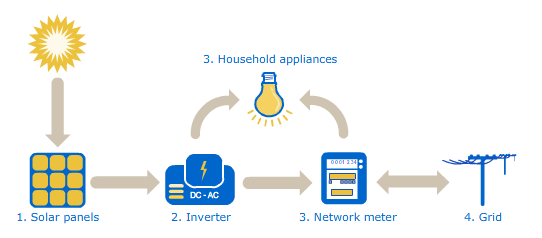
Environment concerns and conscious consumption have been the talk of the hour in recent years. With this, we have particularly seen a growing demand for the renewable energy alternative of solar panels. The popularity of solar has led to many technological advancements in the sector with the promise of further continuous progress. Although this has increased the efficiency of solar panels, there are still certain interferences that need to be addressed.
Let’s understand some of the most prominent factors that affect the performance of a solar panel.
Temperature
Since solar power is completely dependent on sunlight, it is often assumed that high temperatures might increase the efficiency of a solar panel. On the contrary, heat exposure increases the current but in turn, also decreases the voltage in the solar cells. An extreme spike in temperate can also prematurely damage the cells and reduce the life of its operation. There is a need to combat this hurdle, especially since the majority of sunlight that reaches solar panels does turn into heat. Managing the thermal conditions of the solar panels will help maintain the efficiency and the lifetime of these solar panels.
Shade
Any obstruction of light can hamper the performance of a solar panel. The cells that form a solar panel are usually interconnected through wires. Any cell that receives limited light due to shadows or shade falling over it will also affect the flow of current to the other cells. Planning the possibility of shade during the installation of the project can be an effective solution. Additionally, the foolproof alternative would be to avoid panels that are wired in connection to each other.
Orientation
Every solar panel should be positioned in a direction that helps it capture the maximum amount of sunlight. Tilting the panels at a 30 or 40-degree angle ensures that the sunlight hits the panels at a perpendicular angle. This will produce the maximum amount of energy and help dust or snow slide off the panels during the winter. These angles should also be adjusted at times, according to the change in season or sunshine hours.
Hygiene
A clean solar panel surface is also a good way to ensure the conversion of photoelectric power. elements like pollution, dust, rainfall, sand, and snow can reduce efficiency. Frequent cleaning should be conducted and timed as per the situation when there is minimal interference. Solar panels that are cleaned annually or bi-annually will usually produce 3.5% and 5.1% more power.
Reflection
Light being reflected away from the solar panel’s surface can also decrease its efficiency. This justifies the need for cells created with materials that do not have a reflection in them. Untreated silicon, for instance, reflects over 30% of incident light. Treating the materials with an anti-reflection coating or creating a textured surface helps to decrease these reflections. A good indication of high-efficiency cells is that they will appear either black or dark blue.
On reflection, it is clear that all of these factors can be managed with robust operations and management functions. Renowned solar power companies such as Sterling & Wilson Renewable Energy assist with the operations and management of solar power plants by meticulously caring for their useful life, maximizing profitability, streamlining the performance and availability, and minimizing their consumption and operating costs.
Originally published at http://realestateandepc.wordpress.com on May 2, 2022.


